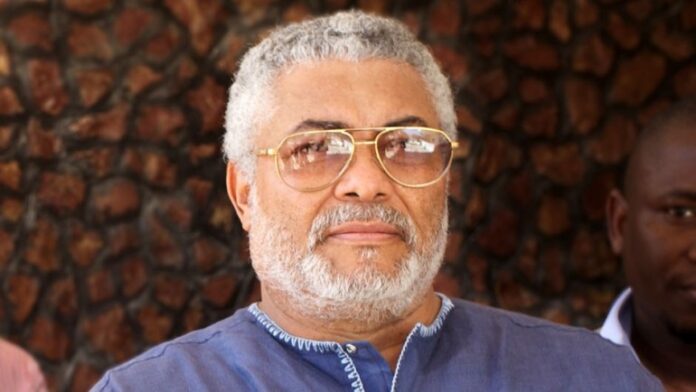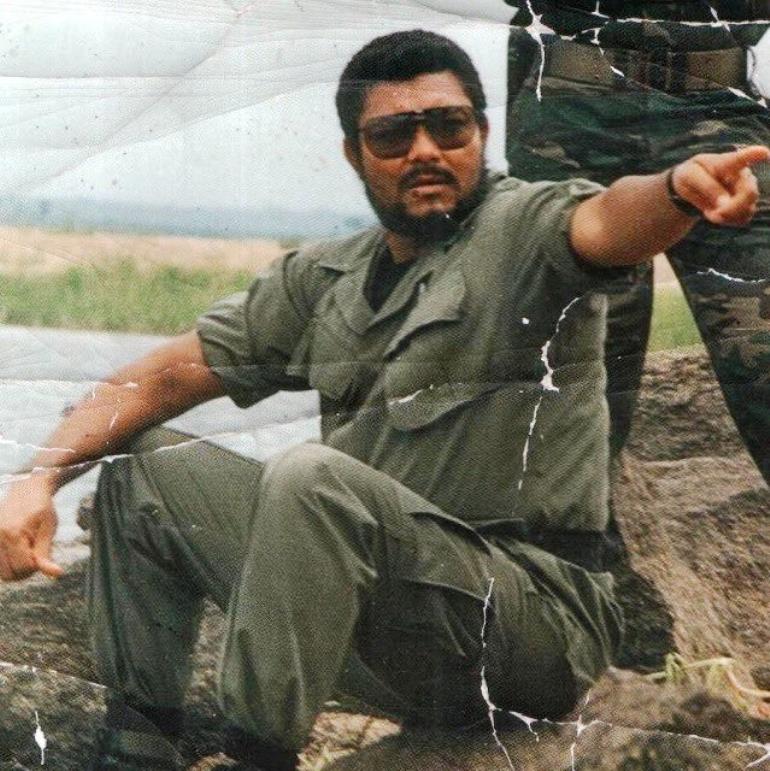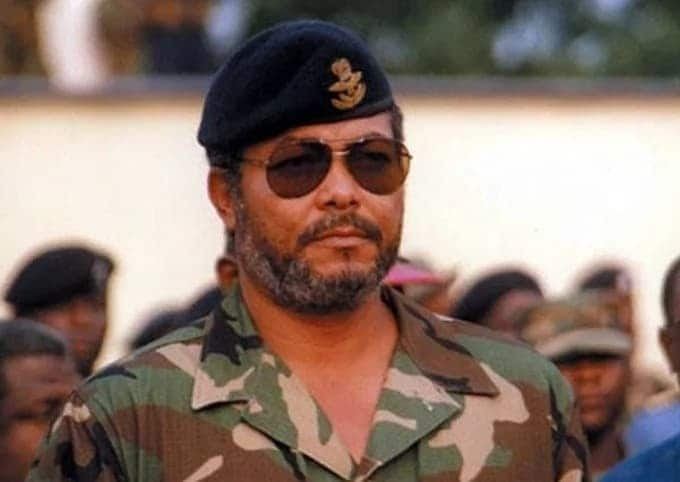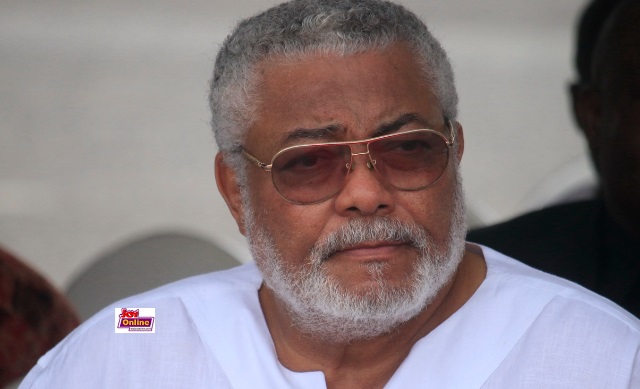
With the demise of 73 year old former President of Ghana Jerry John Rawlings, another tree from Africa has fallen, taking Ghana to the prosperous shift from a military dictatorship to a prosperous democracy.
Early Life and Career
On June 22, 1947, John Jerry Rawlings was born in Accra, Ghana. After his demise, historians take the fragments of their lives and examine them and eventually give them a position in history. Born to a mother from Ghanaian-African origin and father from White Scottish origin, Jerry John Rawlings was a man of people.

In 1967 Rawlings completed his high school at Achimota College. A short time after he became the part of the Air Force of Ghana. In January of 1969 he graduated and was designated as pilot officer. Just after the coup of 1979, he entered a student group at the University of Ghana where, reading and learning about political and social theories, he established a more leftist ideology.
Rawlings is loved to express the truth to authority with his charm and bravery. In Ghana’s past. He is Ghana’s longest serving President ruling from 1981 till 2001. After having decided to restore the nation to democratic rule after its military rule for more than a decade, moreover he is first Ghana’s President of the Fourth Republic.
After the coup which took place on 31 December 1981, he became Head of State in 1981. Rawlings expelled Hilla Limann who said that civil rule was poor and the economy deteriorated. While not ideal, many note the man with his view and viewpoint was principled and genuine.
Rawlings’ Civilian Rule
Prior to his victory in 1979 and in 1981, Rawlings planned two coups. But with the transition from Ghana to democratic elections, he shocked the detractors. Prior to the 1992 elections, Rawlings founded the National Democratic Congress (NDC) and used it to analyse civilian views in order to promote democratic change. The NDC has published a study which recommends the establishment of a national assembly and the formation of a Prime Minister’s post. This study paved the way for Ghana’s democracy.

After leaving, Rawlings remained an African Union delegate in Somalia, a democratic force broker in the Ghana region, whilst working in a variety of foreign diplomatic roles. “The most remarkable thing that Ghanaians will remember Jerry Rawlings for is that he handed over power to a civilian moreover from the opposition something unheard of not only in Ghana but across Africa,” Micah said. “The Ghanaians liked Jerry for being transparent. In his affairs and everything he said stalwart parties or high officials, he was truthful. They loved him.
Vision 2020
In 1995, he delivered a paper named Vision 2020 to Ghana’s Parliament, proposing an ambitious long-term strategy to enhance the human and economic growth of their countries and their networks, as well as rural and urban development. In the 1960s, Singapore had been a middle revenue nation, according to Rawlings, but its illusion was shattered after his replacement John Kuffour had different ambitions for growth. The first move was to pursue Singapore’s example.
Alliance with other Nations
In a “Solidarity of the struggle” Mr. Rawlings allied with the countries of Suriname, Nicaragua, Cuba, Burkina and Faso; he also formed strategic partnerships with the Caribbean countries and some other African countries.
In 1989, Mr. Rawlings welcomed Hon. Minister Louis Farrakhan in Ghana to open a Nation of Islam office which would serve the African Region, against the desires of many advisors who were risking the wrath of America and Britain, and made a move against a determined attempt by the U.S. government to obstruct the reception of Minister Farrakhan by African politicians.
Man of People
Mr. Rawlings claimed he abstained even after his rule, according to observers of his management. After having stepped down, Mr. Rawlings advocated the common man and was close to the citizens owing to constitutional terms limitations.
Ghanaians recall him in Ghana, where Rawlings is nicely recognised as ‘Papa Yay’ – as a warrior in all times who after his time of office, instituted peacefully and democratically shifted influence. The supporters kept the group that they established and worked twice as the elected president of Ghana – the “National Democratic Congress” or NDC, during a vigil in Accra.
“Our founder who has been a legend, and he is still a legend for centuries to come, his legacy reigns, and we are still going to have him in our memory. NDC, as a party, we are going to celebrate a week-long for our departed hero” said the Hajai Mariama Zakeri, NDC organisers.

In 2001, Rawlings shocked analysts, but he managed to dominate Ghana. In 2001 he quit office again. The supporters wept outside his home in Accra after Rawlings’ death on November 12 when the top officials of his party came to meet his family.
Treatment with Refugees
Hundreds and thousands of refugees from Liberia were hosted by Mr Rawlings, displaced in Ghana by a vicious civil war which he had managed to alleviate as a leader of Ghana. President Rawlings has survived by his wife, Nana Konadu Agyeman-Rawlings, a candidate for president in elections next month; his 3 daughters; and one sibling, who has passed away two months after Victoria’s mum. President Rawlings will not be overlooked as they leave a global family benefitting from his commitment.














As backed up by the League of Legends betting sites, Team Liquid are favoured in this match-up. Betting operator meets the requirements and standards set by the Curacao Gaming Commission. The site uses SSL encryption to protect data transmitted between 1win’s server and users’ devices. 1win is an international bookmaker and online casino that has been operating legally in Bangladesh under Curacao license 8048 JAZ2018-040 since 2016. We accept BDT and users from Bangladesh and provide an official free app for Android and iOS for sports betting (cricket, kabaddi, football). Minimum deposit is BDT 400. The minimum withdrawal is INR 500. The new bookmaker was established in 2016. The name FirstBet was picked at first but it was changed to 1Win India in 2018. The bookmaker was granted its own license by the Curacao Gaming Commission (No. 8048 JAZ2018-040). As a consequence, we can safely state that sportsbooks are fully legal and capable of functioning in the Indian betting market.
http://www.wolgeum.org/bbs/board.php?bo_table=free&wr_id=342929
Points are calculated using the formula: Stake Amount * Stake Ratio. The higher the number of points, the higher the amount of the cash prize. In this case, bonus points are not awarded for bets with odds less than 1.6 and more than 10. And for bets with “Returned” and “Sold” status. Once you understand win bets, you could explore full cover bets. The advantage here is you can win a payout even if some of your predictions fail to come true For the April 1st clash with Liverpool he put £5.25 on Salah to score first with City winning 4-1 at 225 1. He won £1,186 at Betfred. The father of three from Moston has been quick to treat Lisa with some of his windfall – he has bought her a brand new lawnmower. Another US star taking Royal Ascot by storm – but who is Queen Mary-winning trainer George Weaver?
Entra a far parte della rivoluzione dei pagamenti digitali. Su KingCasino.it, puoi depositare con Bitcoin e Litecoin per giocare alle tue slot machine online preferite. Goditi transazioni rapide, sicure e senza commissioni, e sfrutta al massimo la tua esperienza di gioco. Betpoint è il sito ideale per gli amanti del poker online, il gioco di carte più popolare al mondo. Sul nostro sito, puoi scegliere tra una vasta gamma di giochi, dai classici come il Texas Hold’em a varianti più moderne come Omaha, con tornei regolari, tavoli cash e freeroll per soddisfare ogni livello di esperienza. Dal trucco dei soldi a quello delle abilità, passando per quello delle relazioni: vi sono trucchi di ogni genere, ognuno adatto per facilitare il gioco e in alcuni casi, anche per aiutare con qualche problema tecnico.
https://wiki-velo.win/index.php?title=Evolution_casino_live
Errato sul conto di winga io ed altre due persone, abbiamo per circa sei mesi, non monitorato, ma messo in funzione , un sistema, adottando la mano del croupier al processore, parlo del soffietto, in cui si hanno alcuni secondi per puntare bene con macchinari che non cito, siamo riusciti ad avere buone vincete, ma aime’ ci siamo accorti, che non e’ un unico processore ma bensi ne conta 12, quindi e qui’ la trasparenza, non credo, solo il fatto che si fanno vedere le vincite e le perdite delle persone, in reale, ma quando dice il croupier le puntate sono terminate, e compare prima che lanci, la musichetta con il cartellone pubbliciatario, be’ li’ la cosa non e tanto pulita, È quindi facilmente intuibile che vincere sempre alla roulette non è possibile, diffida quindi subito da chi ti propone pozioni magiche e sistemi infallibili, per il semplice motivo che non ce ne sono, punto. Se stavi quindi cercando metodi miracolosi per diventare miliardario ci spiace deluderti, ma allo stesso tempo ti invitiamo a non scoraggiarti, perché, per contro, ci sono invece molte strategie e sistemi interessanti per aiutarti ad aumentare la probabilità di vincita al gioco con la roulette.
Cada día actualizaremos este artículo para que consigas tus enlaces de Tiradas Gratis para Coin Master, aqui vas a conseguir muchos premios cada dia, desde 25 tiradas gratis hasta millones de monedas. Así que ves a por ellas y vuelve cada dia a por más. Las máquinas tragamonedas son el centro de Coin Master y pasarás la mayor parte de tu tiempo de juego en esta pantalla. Para acceder a la tragamonedas, simplemente abre el menú del juego y selecciónala, o desliza hacia abajo desde la vista de la aldea. ¡Empezamos! Esta aplicación es recomendada especialmente para todas aquellas personas que se están iniciando en el mundo de las apuestas, es decir, para los principiantes que utilizan una máquina tragaperras virtual por primera vez. Esta App está disponible para dispositivos móviles Android y la cual vas a poder conseguir totalmente gratis en Play Store. En ella podrás ir directamente al juego y apostar sin la necesidad de realizar muchos pasos.
https://iowa-bookmarks.com/story10633909/tragaperras-en-linea
Igualmente los programas de fidelidad del casino, la estabilidad de la web y la facilidad de navegación, también son aspectos importantes a evaluar. Otro punto a tomar en cuenta son las reseñas y comentarios de los demás jugadores del casino en México, por eso en ChoiceCasino, te traemos opiniones de otros usuarios y cuentas con la posibilidad de dejar tu experiencia para guiar a los demás a elegir al mejor operador online de casino en México. JackpotCity Casino es propiedad y está operada por Bayton Ltd, una empresa registrada en Malta con licencia de la Autoridad de Juegos de Malta. Bayton Ltd es una empresa respetable y confiable que opera casi una docena de casinos en línea además de JackpotCity. Esto incluye sitios populares como Ruby Fortune Casino y Spin Palace.
What i do not understood is in reality how you are not really a lot more well-preferred than you might be right now. You’re very intelligent. You understand therefore significantly when it comes to this matter, produced me for my part imagine it from a lot of various angles. Its like women and men are not interested unless it is one thing to accomplish with Lady gaga! Your own stuffs great. Always maintain it up!
Heya! I’m at work browsing your blog from my new iphone! Just wanted to say I love reading through your blog and look forward to all your posts! Keep up the outstanding work!
I would like to thnkx for the efforts you have put in writing this blog. I am hoping the same high-grade blog post from you in the upcoming as well. In fact your creative writing abilities has inspired me to get my own blog now. Really the blogging is spreading its wings quickly. Your write up is a good example of it.